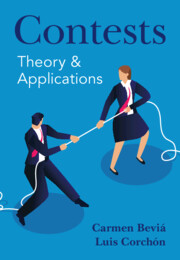Refine search
Actions for selected content:
2 results
7 - Dynamic Contests
- from Part II - Extensions
-
- Book:
- Contests
- Published online:
- 30 May 2024
- Print publication:
- 06 June 2024, pp 95-116
-
- Chapter
- Export citation

Contests
- Theory and Applications
-
- Published online:
- 30 May 2024
- Print publication:
- 06 June 2024
